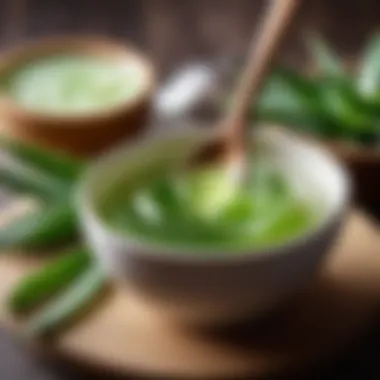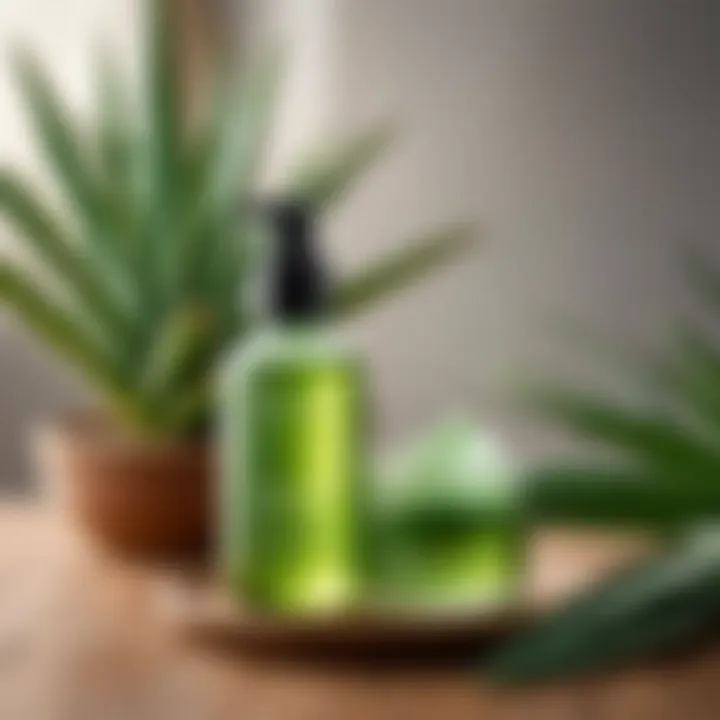Discovering Aloe Vera's Benefits for Facial Care


Intro
Aloe vera has long held a prominent spot in the realm of skincare, and for good reason. The succulent plant, known for its thick, fleshy leaves, is often referred to as the natural healer. But what exactly makes aloe vera a staple in many people's facial care routines? Whether you’re looking to treat sunburn, combat signs of aging, or simply enhance your skin’s hydration, aloe vera steps up to the plate with a range of benefits.
Packed with vitamins, minerals, enzymes, and amino acids, aloe vera can tackle various skin concerns effectively. This article will sift through the myriad benefits this humble plant offers, dissecting its natural properties and how these contribute to healthier skin. By the end, it should be clear why incorporating aloe vera into your facial care routine could be a game-changer.
Ürün İncelemesi
Ürün Tanıtımı
When it comes to facial care, there are few products as versatile as aloe vera. Available in many forms, including gels, creams, and fresh leaf applications, aloe vera is easily accessible. Communities around the world have harnessed its power for generations. It’s often touted as a remedy for burns and minor wounds, but its expertise goes far beyond that. Its ability to nourish and soothe makes it a beloved choice among beauty aficionados and casual users alike.
Ürün Özellikleri
Key properties of aloe vera include:
- Hydration: Aloe vera is composed of over 90% water, making it an ideal ingredient for quenching dry skin.
- Anti-inflammatory: Its natural anti-inflammatory qualities work wonders for soothing irritated skin, perfect for those prone to redness.
- Rich in nutrients: Contains vitamins A, C, E, and B12—essential for skin health.
- Antimicrobial: Can help prevent the growth of bacteria and fungi, which is beneficial for acne-prone skin.
Aloe vera’s unique properties create a dynamic blend, serving multiple purposes. It hydrates, heals, and protects in a way that few other natural ingredients can.
Güzellik İpuçları
Doğal Güzellik Yöntemleri
Incorporating aloe vera into daily routines isn’t difficult. Here are a few tips to get the most out of this powerhouse plant:
- As a moisturizer: Apply pure aloe vera gel directly onto cleansed skin for a refreshing layer of hydration. It absorbs quickly, leaving no greasy residue.
- As a sunburn relief: Use fresh aloe vera straight from the leaf to cool down burned skin.
- As a mask: Combine aloe vera with honey and turmeric for a nourishing face mask that promotes radiance.
Sağlıklı Beslenme ve Güzellik
Furthermore, the benefits of aloe vera extend beyond topical applications. Consuming aloe vera juice can also bring about healthy skin from the inside out. Rich in antioxidants, it helps to detoxify the body, which may reflect on your skin's appearance. When combined with a balanced diet and adequate water intake, aloe vera can aid in achieving that coveted glow.
"Nature itself is the best physician." - Hippocrates
Nurture your skin with the goodness of nature and let aloe vera help you shine by providing what your facial care regimen may be missing.
In the coming sections, we will explore scientific studies supporting aloe's effectiveness and provide practical recommendations. Whether you are a newcomer to the world of aloe or a seasoned user, it pays to dig deeper into its multifaceted benefits.
Understanding Aloe Vera
Aloe vera stands out as more than just a green plant; it embodies a rich tapestry of history, knowledge, and various benefits that intertwine with facial skin care. To truly appreciate its significance in skincare, one must delve deep into the plant's essence, its storied past, and its applicability in today’s beauty routines. Therefore, understanding aloe vera is crucial, as it opens the door to discovering how this simple succulent can become a powerhouse in enhancing skin health.
What is Aloe Vera?
Aloe vera is a succulent plant that has thick, fleshy leaves filled with a clear gel-like substance. This gel is what makes aloe vera famous, particularly for its soothing and healing properties. The plant itself has been cultivated for centuries across many cultures, which speaks to its versatility and relevance.
In a practical sense, aloe vera thrives in hot and dry environments, making it a resilient choice for gardens and homes. Its gel is packed with vitamins, minerals, enzymes, and amino acids, all of which play a pivotal role in promoting skin health. When applied to the skin, aloe vera gel can provide instant relief and hydration, a fact that has captured the attention of both skincare enthusiasts and dermatologists alike.
Historical Uses of Aloe Vera
Historically, aloe vera has served various purposes. Ancient civilizations like the Egyptians regarded the plant as sacred, embedding it in their burial practices as a means of preserving skin even in death. They also utilized aloe vera in cosmetics and medicines, showcasing its importance in beauty and health.
In traditional Chinese medicine, aloe vera has been used to treat a range of ailments, from digestive issues to skin conditions. Likewise, in many indigenous cultures, the gel has been applied for burns and wounds, owing to its healing qualities. This rich history lends credibility to its continued use in modern-day skincare, echoing an age-old knowledge about the plant's restorative properties.
Aloe Vera in Modern Skincare
Fast forward to the present, the role of aloe vera in modern skincare is undeniable. This ingredient has made its way into countless products, from moisturizers to face masks, boasting a plethora of benefits. It is seen as a natural alternative to chemical-laden solutions, appealing to those who prefer a more holistic approach to beauty.
Moreover, many skincare brands are now featuring aloe vera prominently in their formulations, acknowledging its ability to hydrate, soothe, and heal skin. Its presence in gels, creams, and serums indicates a harmonious blend of traditional knowledge with contemporary science. People of all ages are discovering that aloe vera is not just a trend; it’s a timeless staple in skincare routines.
"Aloe vera isn’t just a plant; it's a bridge connecting ancient remedies to modern self-care."
In summary, understanding aloe vera is essential for anyone looking to enhance their facial care regimen. Its historical significance paired with modern applications showcases its versatility and enduring appeal. Knowing how aloe vera benefits the skin lays the groundwork for exploring its nutritional composition, hydration capabilities, and soothing properties in subsequent sections.
Nutritional Composition of Aloe Vera
Understanding the nutritional composition of aloe vera is crucial, as it lays the foundation for its remarkable benefits in skincare. Packed with vitamins, minerals, antioxidants, and enzymes, aloe vera serves not just to hydrate but to nourish the skin deeply. This section will explore these specific components, shedding light on why they matter for our daily facial care routines.
Vitamins and Minerals
Aloe vera is rich in several key vitamins and minerals that can work wonders for the skin. Among these, vitamins A, C, and E stand out prominently. These vitamins act as powerful antioxidants, helping to fend off skin damage caused by free radicals and environmental stressors.
- Vitamin A: Essential for skin repair, this vitamin helps promote healthy cell production. It keeps the skin looking youthful and vibrant.
- Vitamin C: Known for its role in collagen synthesis, vitamin C is vital for maintaining skin firmness and elasticity. It also brightens the complexion and evens out skin tone.
- Vitamin E: This vitamin works together with A and C, providing an extra layer of protection against UV damage. It's also known for its moisturizing properties.
Apart from these, aloe vera contains several minerals like calcium, magnesium, and zinc, which support skin health by promoting healing and combating inflammation. All these nutrients combine effectively, creating a potent cocktail that enhances skin resilience and overall appearance.
Antioxidants and Their Role


Antioxidants are the unsung heroes in skincare, and aloe vera is full of them. These compounds play a significant role in preventing oxidative stress, which is linked to premature aging and various skin ailments.
Aloe vera's antioxidants, including flavonoids and phenolic compounds, work by neutralizing free radicals. This armamentarium helps keep skin cells intact, thereby preventing fine lines and sagging. Regular use of aloe vera can lead to healthier, more youthful-looking skin.
“Antioxidants in aloe vera provide a robust defense against time and environmental aggressors, ensuring not just survival but thriving of skin cells over time.”
Enzymatic Properties of Aloe Vera
Another remarkable aspect of aloe vera lies in its enzymatic properties. The plant contains various enzymes, such as amylase and lipase, which enzymatically break down sugars and fats. This attribute is significant for skin cleansing and purification, as it aids in removing dead skin cells and excess oils that can clog pores.
Moreover, the enzymes present in aloe vera assist in accelerating the healing process of wounds and cuts. This makes aloe vera an indispensable ingredient for people with acne or other skin irritations, as it helps to hasten recovery while keeping the skin balanced and fresh.
Hydration Benefits
When it comes to skincare, hydration is a cornerstone of healthy skin. The benefits of keeping your skin well-hydrated are twofold: it enhances the overall appearance of your skin while also safeguarding it against various environmental stressors. Aloe vera is often hailed as a miracle plant, and for good reason. It’s deeply moisturizing, making it an ideal choice for those looking to improve their facial care routine.
This section explores how aloe vera enhances hydration through its unique properties and mechanisms, focusing on its role in skin health and appearance. A well-hydrated complexion tends to look more vibrant and youthful, and aloe vera serves as a valuable ingredient in achieving that luminous glow.
Moisturization Mechanism
Aloe vera's moisturizing abilities stem from its unique chemical composition, primarily consisting of polysaccharides. These complex carbohydrates not only bind moisture but also create a barrier that helps to maintain your skin's hydration levels over time. The leaf sap of aloe vera absorbs easily into the skin, providing a quick shot of moisture without leaving a greasy residue.
Consider the function of aloe vera in comparison to heavier oils or creams; while those can sometimes clog pores, aloe vera hydrates effectively without the baggage. This makes it an excellent option for a variety of skin types.
Ideal for Dry Skin Types
For individuals with dry skin, aloe vera can truly be a game changer. It offers powerful moisture without overwhelming the skin. The gel-like substance can penetrate the epidermis and offer impactful hydration, which can be dramatically beneficial in dry or arid climates where moisture loss is a concern.
Daily application of aloe vera gel can help reduce the tight, uncomfortable feeling often associated with dry skin. Users have reported seeing noticeable improvements in skin texture and elasticity when incorporating aloe vera into their routines. It’s no wonder that many skincare products for dry skin feature aloe vera as a key ingredient.
Hydration vs. Oily Skin
On the other side of the spectrum, people with oily skin sometimes shy away from hydration thinking it will exacerbate their conditions. However, using aloe vera can provide a balanced approach. It hydrates without adding extra oil, which can help manage shine and prevent breakouts. Aloe vera contains enzymes that can also assist in controlling excess sebum, making it beneficial for those battling oily or acne-prone skin.
In summary, whether your skin falls on the dry or oily end of the spectrum, aloe vera provides essential hydration that caters to various needs. Its ability to hydrate and soothe helps create a more balanced complexion overall.
Soothing Inflammation
Soothing inflammation is one of the standout benefits of aloe vera in facial care. Many individuals regularly contend with skin that burns or itches, not to mention redness and irritation that can stem from numerous causes. Whether it's from prolonged sun exposure, harsh weather, or skin conditions like acne, inflammation can wreak havoc on the skin's appearance and comfort. Aloe vera’s natural properties pave the way for relief in these scenarios, making it a staple remedy for many seeking smoother, healthier skin.
Aloe Vera for Sunburn Relief
Sunburn can turn a pleasant day outdoors into a painful experience. The skin, after taking in too much UV sunlight, often shows signs of redness, swelling, and discomfort. Aloe vera steps in as a gentle, yet effective antidote. The gel from its leaves, recognized for its cooling effect, offers moisture to the dehydrated skin, which is essential for healing. Not only does it lower the temperature of the skin but also alleviates that uncomfortable tightness that comes with sunburn. The polysaccharides and glycoproteins in aloe vera work their magic by promoting skin regeneration while reducing inflammation.
Keep in mind that while aloe vera is a great home remedy, it’s still wise to seek shade and slap on broad-spectrum sunscreen to prevent sunburn in the first place.
Calming Acne-Inflamed Skin
Acne, whether it affects teens or adults, is often accompanied by painful inflammation. Pimples can become throbbing and red, making daily activities uncomfortable. Aloe vera can serve as a soothing agent here too. It possesses antibacterial properties that can help reduce the presence of acne-causing bacteria while also soothing the surrounding inflamed skin.
Applying aloe vera gel directly to the acne-affected areas can help decrease swelling. Within a few days, many users report a notable reduction in redness and discomfort. ((Insert a personal testimoni here for relatability.))
Here’s a tip: combine aloe with a few drops of tea tree oil for added antibacterial benefits.
Reducing Overall Skin Redness
Limiting overall skin redness is crucial for maintaining a balanced skin tone. Daily life can expose us to factors that trigger inflammation. Harsh weather conditions, pollutants in the air, or even certain cosmetics can irritate the skin and lead to redness. Aloe vera acts as a multi-purpose ally in this regard. The moisturizing effect of aloe vera not only hydrates the skin but also promotes a balanced complexion.
Regular usage of aloe vera can bring down redness over time by improving circulation to the skin’s surface while enhancing skin tone. The anti-inflammatory components, such as vitamins C and E, work to build up the skin's defenses against future irritants as well.
"Aloe vera is like a chill pill for your skin, absorbing all that nasty heat from irritation and leaving behind calmness."
Aloe Vera as an Antimicrobial Agent
Aloe vera has long been revered not just for its soothing properties but also for its antimicrobial abilities. This aspect plays a crucial role in skincare, as healthy skin acts as a barrier against bacteria, fungi, and other potential threats. With aloe vera’s natural compounds, it offers a multifaceted approach to maintaining skin health, helping to prevent infections while promoting an overall healthier complexion. This section will dive into how aloe vera fights off bacterial infections, its benefits against fungal infections, and how it supports the skin barrier function.
Fighting Bacterial Infections
One of the standout features of aloe vera is its effectiveness in combating bacterial infections. This is largely due to its rich composition of polysaccharides and glycoproteins, which have shown antimicrobial properties in various studies. These compounds create an unfavorable environment for bacteria to thrive. For instance, research suggests that Aloe Barbadensis can inhibit the growth of essential pathogens like Staphylococcus aureus and Escherichia coli, both of which are known to cause skin infections.
When applied topically, aloe vera gel creates a protective layer on the skin that can help prevent bacteria from entering wounds or irritations. This makes it particularly beneficial for those with acne-prone skin. The gentle nature of aloe helps soothe inflammation while its antimicrobial properties work to reduce bacterial presence, potentially leading to fewer breakouts over time.
Benefits Against Fungal Infections
Fungal infections, just like bacteria, can wreak havoc on the skin and often require specialized treatments. Fortunately, aloe vera also comes to the rescue in this department. Its naturally occurring compounds can impede the growth of fungi. For example, a study highlighted in the Journal of Dermatological Treatment suggests that aloe vera gel exhibits efficacy against fungi such as Candida albicans, which is commonly associated with skin issues like athlete’s foot.
Notably, using aloe vera in your skincare regimen may help to prevent fungal infections from taking hold and assist in healing affected areas. This is especially relevant for individuals who experience persistent fungal outbreaks or those living in humid environments where infections thrive. The anti-fungal properties of aloe vera not only assist in healing but also provide a cooling sensation, alleviating discomfort associated with athlete’s foot or similar conditions.


Supporting Skin Barrier Function
Beyond its impressive antimicrobial properties, aloe vera acts as a pivotal support for the skin's barrier function. The skin barrier is the body's first line of defense against pathogens. When it is compromised, the risk of infections escalates significantly. Aloe vera aids in maintaining and restoring this barrier through its hydrating and nourishing properties.
Key aspects of aloe’s support for the skin barrier include:
- Hydration: Aloe vera is renowned for its ability to hydrate the skin. With its water content and ability to penetrate deeply into the skin, it helps replenish moisture, keeping the barrier intact.
- Nutrient-Rich: The vitamins (such as Vitamin C and E) and antioxidants present in aloe vera also play a role in skin repair and resilience.
- Natural Anti-inflammatory: This means that aloe not only protects but also calms any irritations that may compromise the barrier.
Incorporating aloe vera into daily skincare routines can significantly enhance the skin's ability to withstand environmental assaults, whether they be from bacteria, fungi, or pollutants.
"Aloe vera not only serves to hydrate but stands as a protector that fosters skin resilience against infections."
Anti-Aging Properties
The world of skincare is vast, constantly evolving and buzzing with new trends and innovations. Yet, one topic seems to remain a perennial favorite: the quest for youthful skin. When it comes to anti-aging solutions, aloe vera has earned its place as a beloved ingredient in the beauty arsenal. It’s almost a magic potion, don’t you think? Not only does it hydrate and soothe, but it also boasts properties that can genuinely combat the signs of aging.
From promoting collagen production to improving skin elasticity, aloe vera works diligently to keep our skin looking its best as time ticks on. It’s vital for both men and women of all ages to understand how and why this humble plant plays a key role in maintaining youthful skin.
Promoting Collagen Production
Collagen is a fibrous protein that serves as the backbone of our skin’s structure. As we age, our bodies produce less of this essential component, leading to sagging and wrinkles. Aloe vera can assist in promoting collagen synthesis, which directly influences skin firmness and texture. The polysaccharides found in aloe vera stimulate fibroblasts, the cells responsible for collagen production. This helps to ensure that our skin retains its plumpness and elasticity.
Incorporating aloe vera into your skincare routine might feel like a no-brainer, especially when considering its collagen-boosting capabilities. You could apply pure aloe vera gel directly to your skin or seek products enriched with this botanical wonder. Adding it to your moisturizer not only enhances hydration but also potentially fortifies the skin’s structural integrity.
Reducing the Appearance of Fine Lines
Fine lines are often the first visible signs that time is taking its toll on our skin. However, one of the attractive aspects of aloe vera is its ability to soften and diminish these pesky marks. Thanks to its natural properties, aloe vera promotes healing and skin regeneration, which can significantly reduce the appearance of fine lines over time.
In fact, regular application might blur those lines as your skin begins to renew itself. You may opt for a gentle massage using aloe vera gel, allowing it to penetrate deeper into the skin. The cooling sensation can also bring extra relief after a long day. A soothing touch along with powerful ingredients indeed makes a world of difference!
Aloe Vera for Skin Elasticity
As we navigate the journey through life, skin elasticity tends to fade. It’s akin to an old, stretched-out rubber band that just doesn’t snap back the way it used to. The good news is that aloe vera may help restore some of that elasticity.
Rich in vitamins and antioxidants, aloe vera nourishes the skin while combatting harmful free radicals that can accelerate aging. The gel acts as a natural humectant, drawing moisture into the skin, providing hydration that is crucial for maintaining elasticity. Moreover, it aids in repairing damaged skin cells and revitalizes dull skin, bringing forth a youthful glow.
Incorporating aloe vera into your routine, whether through topical application or as part of a homemade mask, can provide a boost for skin elasticity. As they say, a little TLC goes a long way!
"Natural, regenerative methods like those offered by aloe vera can pave the way for healthier, more youthful skin without relying solely on invasive procedures."
In closing, aloe vera serves as a powerhouse in the realm of anti-aging skincare, providing multiple mechanisms to promote healthier-looking skin. By fostering collagen production, diminishing fine lines, and improving skin elasticity, this plant underlines the strength of nature in the pursuit of ageless beauty.
Practical Application of Aloe Vera
Aloe vera holds a significant place in facial care routines, not just as a trendy ingredient but as a powerhouse of benefits. Understanding how to incorporate this natural gem into daily habits can elevate one’s skincare game to new heights. In this section, we will explore several practical applications of aloe vera, specifically focusing on how to use aloe vera gel, creating homemade masks, and selecting the right aloe products. Each point will provide actionable insights that can help optimize facial health.
How to Use Aloe Vera Gel
When it comes to applying aloe vera gel directly on the face, the process is straightforward yet immensely beneficial. Here’s how anyone can do it:
- Choose Pure Gel: Always opt for 100% pure aloe vera gel, either from an aloe leaf or a trusted shop. This ensures no artificial fillers are present.
- Cleanse the Face: Begin with a clean slate – wash your face with a mild cleanser to remove dirt and excess oil.
- Apply Generously: Take a small amount of aloe vera gel, and gently massage it into the skin, covering areas prone to dryness or irritation.
- Let It Soak In: Allow the gel to absorb for about 15-30 minutes before rinsing it off with lukewarm water. Alternatively, one can leave it on overnight for deeper moisturization.
This method is particularly effective for soothing sunburn or irritation, as aloe has cooling properties that can provide instant relief.
Incorporating Aloe Vera in Homemade Masks
Aloe vera lends itself well to various homemade masks. It combines beautifully with other ingredients to amplify its benefits. Here are some popular recipes:
- Aloe and Honey Mask: Mix equal parts of aloe vera gel and honey. Apply to the face for a hydrating and antibacterial treatment that can not only moisturize but also promote healing.
- Aloe and Oatmeal Exfoliating Mask: Blend aloe gel with finely ground oatmeal. This mask acts as a gentle exfoliator. Rubbing it softly on the skin removes dead cells without irritation and presents a fresh glow.
- Aloe and Yogurt Brightening Mask: Combine aloe gel with yogurt for a nourishing and brightening effect. The lactic acid in yogurt works wonders for skin texture.
These masks can be applied 1-2 times a week, providing a fresh dose of nutrients while being free of harsh chemicals found in commercial products.
Choosing the Right Aloe Product
With a multitude of aloe products on the market, selecting the right one can be daunting. Here are some tips to keep in mind:
- Look for Transparency: Check the ingredient list. The fewer the ingredients, the better. Products should primarily feature aloe vera as the star ingredient.
- Consider the Form: Aloe vera is available in various forms: gel, cream, juice, or powder. For facial care, gel or cream is often more effective. Juice may be beneficial more for consumption.
- Hypoallergenic Options: If someone has sensitive skin, looking for hypoallergenic options can help avoid unwanted reactions.
Ultimately, buying from reputable brands or health food stores can increase the odds of finding high-quality aloe vera products that truly benefit skin health.
Aloe vera is not just a plant; it’s a versatile ally in facial care, assisting in healing, hydrating, and rejuvenating the skin.
As we move forward, understanding how to leverage aloe vera brings practical skills that anyone can apply, transforming a simple skincare routine into a rich, nourishing experience.
Potential Side Effects of Aloe Vera


Understanding the benefits of aloe vera is vital, but equally important is recognizing its possible downsides. Aloe vera is generally well-tolerated; however, like any natural product, it can cause reactions in some individuals. When considering adding aloe vera to your facial care routine, it's essential to be aware of the potential side effects, both to maximize the benefits and to avoid any unpleasant surprises.
Skin Sensitivity and Allergies
One of the most significant concerns people face when using aloe vera is skin sensitivity. Some individuals may experience allergic reactions when applying aloe vera gel or products that contain it. Common signs of sensitivity include redness, itching, and a burning sensation. These reactions can often be traced back to certain compounds within aloe vera or additional ingredients within commercial products.
To minimize risks:
- Conduct a patch test: Dab a small amount of aloe vera on your inner wrist or behind your ear and wait for 24 hours. If you notice no adverse reactions, it’s likely safe for you to use.
- Choose pure aloe vera: When possible, opt for products that contain high concentrations of pure aloe vera and fewer additives.
"Always trust your skin. If it doesn’t like something, it will let you know!"
Interactions with Other Ingredients
Mixing aloe vera with other skincare products can sometimes result in unforeseen problems. For instance, aloe vera is known for its soothing qualities, but when layered with harsh ingredients like salicylic acid or alcohol-based toners, it can exacerbate skin discomfort. Additionally, some combinations might neutralize each other's effects, leaving you less effective results.
To avoid potential interactions:
- Read product labels: Be cautious with products that claim overly sensational benefits. Sometimes, they mix too many active ingredients that can cause irritation.
- Introduce products slowly: If you’re trying other new ingredients, consider adding one at a time to see how your skin reacts before mixing them freely.
Consulting with a Dermatologist
Before diving into the use of aloe vera, particularly if you have existing skin conditions or are sensitive-skinned, consulting with a dermatologist is a step worth considering. A professional can assess your skin's needs and recommend suitable aloe vera products or suggest alternative treatments, particularly if you have concerns about allergic reactions or interactions.
Dermatologists can also provide insights on:
- Personalized advice: Tailoring an approach to your specific skin type and concerns can make a world of difference.
- Safe usage: Expertise can help with guidance on the quantity and frequency of application to avoid cumulative irritation.
In summary, while aloe vera holds several benefits for facial care, awareness about its possible side effects ensures you use it safely and effectively, allowing you to reap the rewards without the risks.
Scientific Research on Aloe Vera
Understanding the scientific research behind aloe vera is crucial for anyone interested in facial care. This section zooms in on various studies that lend credence to the numerous claims about aloe vera's beneficial properties. By exploring this, one can make informed decisions about incorporating aloe vera into their skincare routine.
Clinical Studies Supporting Effectiveness
Several clinical studies have examined the efficacy of aloe vera in relation to various skin issues. One notable study published in the Journal of Dermatological Treatment investigated aloe's potential in healing wounds and burns. Researchers found that participants who used aloe vera gel on their skin experienced faster healing than those who used standard treatments alone.
Another research effort looked into aloe vera's effectiveness in treating acne. The findings indicated that products containing aloe vera could significantly reduce acne lesions while calming inflammation. This underscores aloe vera's role not just as a moisturizer but also as a therapeutic agent against prevalent skin conditions.
"Aloe vera shows promise not only as a moisturizer but as a therapeutic agent for skin conditions" - Journal of Dermatological Treatment.
Aloe Vera and Skin Conditions - A Review
A comprehensive review focuses on the utility of aloe vera against different skin conditions, exploring its mechanisms of action. According to this study, aloe vera is considered beneficial for atopic dermatitis, psoriasis, and even chronic skin ulcers. The gel's rich composition helps in reducing inflammation and promoting skin cell regeneration, making it a formidable candidate for skin treatment.
Another analysis shed light on the impact of aloe vera on aging skin. It was revealed that aloe vera could improve skin elasticity and hydration levels, thereby contributing to a more youthful appearance. This dual action helps us understand why individuals across diverse demographics are turning towards aloe vera for their skincare remedies.
Future Directions in Research
Looking ahead, it's essential to consider the future paths researchers might explore concerning aloe vera. With its popularity soaring, especially in natural skincare circles, scientists are urged to delve deeper into the specific active compounds in aloe that confer its benefits. Further investigations into the synergy between aloe and other natural ingredients might also yield new formulations that elevate its efficacy.
Certain areas, such as its effectiveness in combating skin cancer and enhancing photoprotection, remain significantly under-researched. With advancements in clinical methodologies and a growing database of anecdotal experiences, future studies could offer invaluable insights. Moreover, the collaboration between dermatologists and ethnobotanists may present new opportunities for understanding traditional uses through a scientific lens.
In summary, as aloe vera continues to capture interest, ongoing research is pivotal to substantiating its place in skincare. With every study and review, the narrative around aloe vera’s efficacy becomes clearer, and its applications more diverse.
Epilogue
Emphasizing the multitude of advantages that aloe vera brings to facial care is critical in understanding its overall impact on skin health. From hydration to anti-aging properties, aloe vera serves various needs, making it a versatile ally in skincare. Moreover, it resonates well across different skin types, with a history steeped in both traditional and modern applications. This aligns perfectly with the contemporary desire for natural, effective beauty solutions.
Summary of Benefits
Aloe vera boasts several noteworthy distinctions that make it a sought-after choice for facial care:
- Hydrating properties: It acts as a moisture magnet, effectively replenishing skin's hydration.
- Anti-inflammatory effects: Helps calm irritations due to sunburn or acne, providing relief for sensitive skin.
- Antimicrobial action: Protects skin from potential bacterial and fungal threats, promoting overall skin health.
- Collagen enhancement: Facilitates skin elasticity and firmness, helping to reduce fine lines and wrinkles.
In summary, the properties of aloe vera blend seamlessly to create an effective approach for maintaining healthy, glowing skin.
Integrating Aloe Vera into Daily Routine
To harness the benefits of aloe vera effectively, one must consider simple ways to incorporate it into their daily routine:
- Start with pure gels: Applying aloe vera gel directly from the leaf is an excellent practice for targeted treatment.
- Mix it into moisturizers: Adding a few drops of aloe vera gel into your daily moisturizer can boost hydration levels.
- Use it in face masks: Craft homemade masks using aloe vera mixed with honey or oatmeal for a nourishing treatment.
- Incorporate into serums: Look for serums that feature aloe vera as a primary ingredient for an added layer of care.
By implementing these practices into your skincare regimen, the advantages of aloe vera may significantly manifest in improved skin texture and health.
Encouraging Further Exploration
While aloe vera presents an impressive array of benefits, its potential continues to be explored in the skincare community. Individuals are encouraged to:
- Stay informed: Regularly check scientific journals and articles on aloe vera to glean new insights about its applications.
- Experiment with products: From gels to creams, trying varied formulations can yield different benefits while determining what works best for your skin.
- Consult professionals: Engaging with dermatologists or skincare specialists can provide tailored recommendations and uncover more about interactive ingredients.
As interest in natural skincare grows, continuing to explore the diverse offerings of aloe vera allows individuals to personalize their facial care routines effectively.







